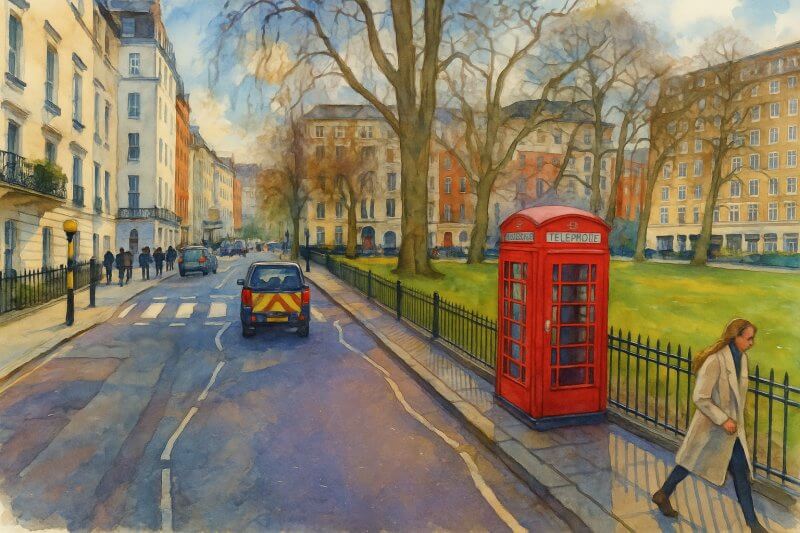
Mayfair - London's Prestigious and Historic District
Where Is Mayfair?
Mayfair is an affluent district located in the heart of the City of Westminster, part of central London. It sits strategically between Hyde Park to the west, Oxford Street to the north, Regent Street to the east, and Piccadilly to the south. This prime location places Mayfair at the intersection of London's most luxurious and historic zones, making it one of the city's most desirable addresses.Size and Population
Mayfair covers approximately 1.3 square kilometres (0.5 square miles), making it a relatively compact district by London standards. Despite its modest size, Mayfair has a notable population due to the mix of residents, office workers, and visitors.The residential population of Mayfair is estimated at around 5,200 people. However, the daytime population is significantly higher due to the area's commercial and hospitality sectors.
Mayfair is known for its extreme affluence. According to recent statistics, the average income per capita in Mayfair is considerably higher than the London average. While the average annual income in London hovers around £35,000-£40,000, the average in Mayfair can exceed £100,000, reflecting the district's status as one of the wealthiest areas in the UK.
Map of Mayfair - London's Prestigious and Historic District
History of Mayfair
Mayfair's development began in earnest during the late 17th and early 18th centuries. Originally, the area was part of the open fields to the west of London. In the 1680s, wealthy aristocratic families, notably the Grosvenor family, began to develop the land into a prestigious residential district.By the 18th century, Mayfair had become synonymous with wealth and refinement. Elegant Georgian townhouses lined its streets, and it attracted members of the upper classes, foreign embassies, and exclusive clubs. The 19th and 20th centuries saw further development, with luxury hotels, art galleries, and high-end retail establishments reinforcing Mayfair's elite status.
Origin of the Name "Mayfair"
Mayfair takes its name from the "May Fair," a lively annual event that was held in the area each spring from the late 1600s until the 1760s. The fair originally took place near Haymarket but moved to the site that is now Shepherd Market in 1686. Although popular, the May Fair developed a reputation for rowdy behaviour and attracted criticism from the upper classes. It was eventually suppressed in the 1760s. However, the name stuck, and by then, the neighbourhood had become a fashionable district for the elite, solidifying "Mayfair" as the area's permanent name.Major Roads in Mayfair
Mayfair is bounded and crossed by several major roads that are well-known to Londoners and tourists alike. These include:- Park Lane - Running along the eastern edge of Hyde Park, it's one of London's most iconic boulevards.
- Piccadilly - The southern border of Mayfair, home to The Ritz and several luxury arcades.
- Oxford Street - The northern boundary, famous for its shopping but also home to the eastern edge of Mayfair.
- Bond Street - Divided into Old and New Bond Street, this world-famous shopping destination cuts through the heart of Mayfair.
- Grosvenor Street and Brook Street - Elegant roads connecting key areas of Mayfair.

Painting of Mayfair (View full-size image here)
Notable Buildings and Sights
Mayfair is home to some of London's most prestigious buildings and cultural landmarks. Key sights include:- Grosvenor Square - Often called the heart of Mayfair, this historic square was once home to the American Embassy and now features luxury residences and a commemorative statue of Franklin D. Roosevelt.
- Berkeley Square - A beautiful green space surrounded by elegant 18th-century buildings.
- The Royal Academy of Arts - Located just outside the eastern edge of Mayfair on Piccadilly, this cultural institution is closely associated with the area.
- Claridge's Hotel - An iconic 5-star hotel on Brook Street, known for its opulence and celebrity guests.
- Shepherd Market - A charming and somewhat hidden area with boutiques, restaurants, and historic pubs, preserving a village-like atmosphere in the midst of central London.
London Underground Stations Serving Mayfair
Mayfair does not have its own dedicated Tube station, but it is well-served by several stations on its edges:- Green Park Station - Serves the Jubilee, Piccadilly, and Victoria lines. It's located on the southeastern side of Mayfair, near The Ritz and Green Park.
- Bond Street Station - Serves the Central and Jubilee lines. Located to the northeast, near Oxford Street and the entrance to New Bond Street.
- Oxford Circus Station - Serves the Bakerloo, Central, and Victoria lines. Positioned at the northeast corner of Mayfair.
- Hyde Park Corner Station - Serves the Piccadilly line. Found on the southwestern side, giving access to Park Lane and Hyde Park.
A Fun Fact About Mayfair
One of the most well-known fun facts about Mayfair is its prestigious place on the British version of the Monopoly board. It is the most expensive property in the game, highlighting its reputation for exclusivity and wealth. In the original 1935 UK edition of Monopoly, Mayfair cost £400 - a fortune in Monopoly terms - and today it still represents the pinnacle of London real estate in pop culture.Conclusion
Mayfair stands out as one of the most elegant and historically rich districts in London. From its aristocratic origins and prestigious squares to its luxury boutiques and iconic hotels, Mayfair has long symbolised refined living. Whether you're walking through its quiet, leafy streets or shopping along Bond Street, the neighbourhood offers a unique blend of history, elegance, and contemporary culture.For both locals and tourists, exploring Mayfair is a journey into the luxurious heart of London.